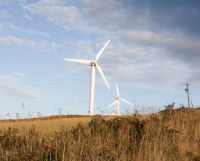

Those living near new windfarm developments could be offered a chance to invest in them as part of a scheme to encourage residents that may have been otherwise opposed to the turbines. Stakes could start at as little as £5 hopefully giving a diverse range of people the chance to get involved.
It has been proposed in a new report produced for the Liberal Democrat energy and climate secretary, Ed Davey, that communities should be given the chance to own up to a quarter of projects.
Windfarms have proven a controversial debate amongst some people and the Tory party have even promised to pull the plug on onshore windfarm subsidies if they win the 2015 election.
New voluntary guidelines from the "Shared Ownership Taskforce" are motivated to prevent the threat of government legislating for community ownership of renewable energy projects.
Maria McCaffery, the chair of the task force and chief executive of trade body RenewableUK hopes this opportunity will help strengthen support for windfarms. She stated: "We hope with this vehicle to attract some of those that haven't liked us in the past. We've knocked ourselves out to make it an affordable thing. There was a very strong message from the outset that this wasn't just to be for the wealthy, not just for those who could afford new share certificates for £250."
Not all projects will be appropriate for the scheme but it is thought those projects of £2.5 million and up will be available for the ownership offer. In the case of onshore windfarms this would include an impressive 80-90% of developments.
Renewable energy companies are not all enthusiastic, and ultimately the suggestion that developers should engage with local people and offer the chance of ownership at the earliest possible stages of a project is not compulsory for companies. There have been worries that engagement could become costly.
A spokeswoman for the Solar Trade Association, Leonie Green, commented: "Forming direct financial relationships with communities is exciting, but there are still important unknowns on the costs of some of these approaches."